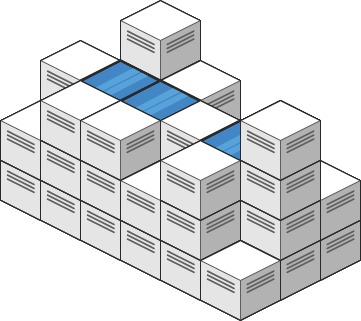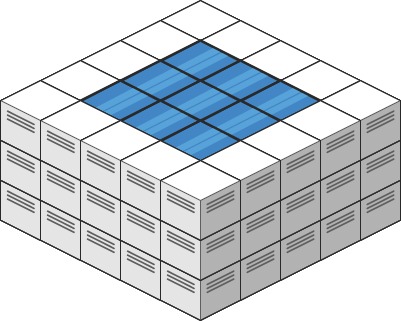LeetCode-in-Java
407. Trapping Rain Water II
Hard
Given an m x n integer matrix heightMap representing the height of each unit cell in a 2D elevation map, return the volume of water it can trap after raining.
Example 1:

Input: heightMap = [[1,4,3,1,3,2],[3,2,1,3,2,4],[2,3,3,2,3,1]]
Output: 4
Explanation:
After the rain, water is trapped between the blocks.
We have two small ponds 1 and 3 units trapped.
The total volume of water trapped is 4.
Example 2:

Input: heightMap = [[3,3,3,3,3],[3,2,2,2,3],[3,2,1,2,3],[3,2,2,2,3],[3,3,3,3,3]]
Output: 10
Constraints:
m == heightMap.lengthn == heightMap[i].length1 <= m, n <= 2000 <= heightMap[i][j] <= 2 * 104
Solution
import java.util.Objects;
import java.util.PriorityQueue;
public class Solution {
private static class Cell implements Comparable<Cell> {
private int row;
private int col;
private int value;
public Cell(int r, int c, int v) {
this.row = r;
this.col = c;
this.value = v;
}
@Override
public int compareTo(Cell other) {
return value - other.value;
}
@Override
public boolean equals(Object o) {
if (this == o) {
return true;
}
if (o == null || getClass() != o.getClass()) {
return false;
}
Cell cell = (Cell) o;
return row == cell.row && col == cell.col && value == cell.value;
}
@Override
public int hashCode() {
return Objects.hash(row, col, value);
}
}
private int water;
private boolean[][] visited1;
public int trapRainWater(int[][] heightMap) {
if (heightMap.length == 0) {
return 0;
}
PriorityQueue<Cell> walls = new PriorityQueue<>();
water = 0;
visited1 = new boolean[heightMap.length][heightMap[0].length];
int rows = heightMap.length;
int cols = heightMap[0].length;
// build wall
for (int c = 0; c < cols; c++) {
walls.add(new Cell(0, c, heightMap[0][c]));
walls.add(new Cell(rows - 1, c, heightMap[rows - 1][c]));
visited1[0][c] = true;
visited1[rows - 1][c] = true;
}
for (int r = 1; r < rows - 1; r++) {
walls.add(new Cell(r, 0, heightMap[r][0]));
walls.add(new Cell(r, cols - 1, heightMap[r][cols - 1]));
visited1[r][0] = true;
visited1[r][cols - 1] = true;
}
// end build wall
while (!walls.isEmpty()) {
Cell min = walls.poll();
visit(heightMap, min, walls);
}
return water;
}
private void visit(int[][] height, Cell start, PriorityQueue<Cell> walls) {
fill(height, start.row + 1, start.col, walls, start.value);
fill(height, start.row - 1, start.col, walls, start.value);
fill(height, start.row, start.col + 1, walls, start.value);
fill(height, start.row, start.col - 1, walls, start.value);
}
private void fill(int[][] height, int row, int col, PriorityQueue<Cell> walls, int min) {
if (((row >= 0 && col >= 0) && (row < height.length && col < height[0].length))
&& !visited1[row][col]) {
if (height[row][col] >= min) {
walls.add(new Cell(row, col, height[row][col]));
visited1[row][col] = true;
} else {
water += min - height[row][col];
visited1[row][col] = true;
fill(height, row + 1, col, walls, min);
fill(height, row - 1, col, walls, min);
fill(height, row, col + 1, walls, min);
fill(height, row, col - 1, walls, min);
}
}
}
}

